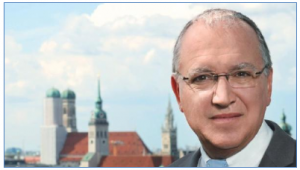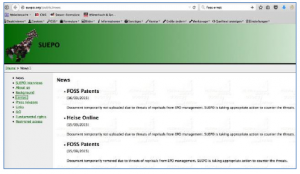
EARLIER today we noticed an update from SUEPO, which had updated its public page to include this translation of an important article from Heise Online, a leading German publication focused on IT, even GNU/Linux at times.
English translation
Union accuses European Patent Office of Censorship
17.09.2015 18:02 Christian Kirsch
vorlesen

EPO-President Benoît Battistelli
The Office management are accused of having arranged for the staff union to have links to Websites removed which have been reporting on internal conflicts – among them to heise online. The Office denies the accusations.
The disputes between employees and management at the European Patent Office have led to a number of press reports this week. The staff union SUEPO had set up links on its Website to some of these reports, but now all that appear are statements to the effect that pressure from the EPO management has led to the links having to be removed. But the management, when asked, denied exerting any kind of influence in this connection. They say that the union alone is responsible for its Website. The report on heise online, for example, had been quoted in their own internal press review.

Allegedly, the union has been forced to remove links to messages at fosspatents.com and heise.de under pressure from the Office management.
But in the past the Office has done some unusual things. For example the EPO management arranged for public and “semi-public” computers in the Office building to be monitored by cameras and for keyloggers to be installed on them, as patent observer Florian Müller reported. The reason for this is that the management are trying to identify leaks which are spreading “defamatory and injurious” contentions about Vice-President Željko Topić. The allegation is that a number of criminal prosecutions are pending against Topić in Croatia.
As an international organization, the EPO is not subject to any national labour legislation or jurisdiction. Disputes between management and staff are the concern of the International Labour Organization in Geneva. Supervision at the EPO is exercised by a 38-person Administrative Council, who are delegated by the Member States of the European Patent Convention, and in the past they have always solidly backed the EPO management.
Administrative Council in conflict of interest
Critics suspect there are two reasons for this. On the one hand, a large part of the income for the EPO comes from the patent offices of the Member States. Rumours abound, for example, that Germany acquires some 100 million Euro per year, although neither the German Patent and Trademark Office nor the EPO will publish exact figures. On the other hand, members of the Administrative Council would also be reckoning on their chances of securing one of the very well recompensed EPO positions; the career followed by the German EPO Vice-President Raimund Lutz, for example.
On enquiry, the Federal Ministry of Justice confirmed that the Basic Law applies equally to EPO employees, and in particular freedom of speech. The Ministry would make no comment, however, on the present state of affairs.